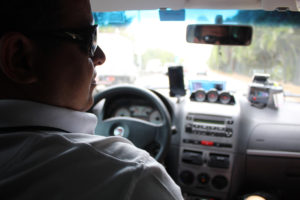For taxi drivers, staging the Olympic Games in Rio poses the idea of promise and hope for a better future. This is what taxi driver Márcio José do Couto Ferreira hopes. But stressful Olympic preparations and the current reality of the taxi business provide evidence that future payback is less than certain.
Marcio is one of thousands of classic taxi drivers in Rio, just a local guy trying to make a living. Many of his taxi-driving counterparts staged a demonstration today — Friday, Aug. 12 — near Rio’s main Olympic Park at Barra da Tijuca, designed to call attention to an ongoing conflict with Uber. The U.S. Department of State sent an advisory about the protest to American visitors, recommending that they use public transportation rather than taxis or Uber vehicles to attend athletic events. “While protests by taxi drivers do not specifically target U.S. citizens, tensions will likely be high between Uber operators and taxi drivers across the city. U.S. citizens should exercise caution,” the advisory said.
Marcio hoped that the stress created by construction and congestion in the lead-up to the games would soon be replaced by a positive legacy of increased business and smoother traffic connections. During preparations, Marcio said, “many areas are intersected, many streets are blocked, viaducts are being built, and people have been affected with traffic for a long time. We can not enjoy all of this stuff, yet.”
The Olympics bring hundreds of thousands of people to Rio, creating long days of continuous work and booming business for taxi drivers. But heavy traffic, long car rides, and tensions with Uber show the darker side for Marcio and his industry.
Seven years ago, Marcio, 44, became a taxi driver when his personal business began to fail. He drives his privately owned cab during the day to put food on the table for his family and to scrounge enough money to pay rent. Ask about Uber, and his reaction is clear.
“What Uber is doing to the taxi industry is cowardice,” Marcio said, through an interpreter. “The typical taxi client is now taking Uber because it is cheaper. Taxi drivers are crossing their arms about the situation. Not by choice, though. Uber drivers drive for extra money to buy their beers, leaving taxi drivers with less money to take home for their families.”
 Because Uber offers advantages in price, billing, and ordering, Marcio explained that his solution to keep his business successful is to work more hours, and to form loyal partnerships with all of his customers in hopes they keep coming back.
Because Uber offers advantages in price, billing, and ordering, Marcio explained that his solution to keep his business successful is to work more hours, and to form loyal partnerships with all of his customers in hopes they keep coming back.
While taxi drivers and Uber drivers find themselves competing in their own Olympic Games, Brazilians like Marcio hope that a promised Olympic legacy will soon arrive and deliver on the hopes of his community.
Marcio said, “Things are always improving a lot. Not as fast as we want, but yes, it is always improving.” So, the wait continues.
Marina Scherer, a journalism major at Mackenzie Presbyterian University in São Paulo, served as Rio field producer and Portuguese translator on this story.
Photo: Márcio José do Couto Ferreira in his taxi near Barra da Tijuca beach in Rio.


[…] students are working on — about the impact of the Olympics on low-income communities in Rio or on taxi and Uber drivers that drive spectators to […]